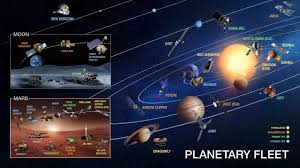The Fascinating World of Planetary Science
Planetary science is a captivating field that delves into the study of planets, moons, and other celestial bodies within our solar system and beyond. It encompasses a wide range of disciplines, including astronomy, geology, physics, chemistry, and biology, to help us better understand the formation and evolution of planets.
Exploring Our Solar System
One of the primary goals of planetary science is to explore and analyze the various planets within our solar system. From the rocky terrain of Mars to the swirling storms on Jupiter, each planet offers unique insights into the processes that shape these celestial bodies.
Robotic missions like NASA’s Mars rovers and spacecraft like the Voyager probes have provided invaluable data about planetary surfaces, atmospheres, and magnetic fields. These missions have revolutionized our understanding of planetary geology, climate patterns, and potential for life beyond Earth.
Beyond Our Solar System
Planetary science also extends its reach beyond our solar system to study exoplanets – planets orbiting stars outside our sun. By analyzing the composition and characteristics of these distant worlds, scientists hope to uncover clues about the prevalence of habitable environments in the universe.
The discovery of exoplanets has opened up new avenues for research in planetary science, challenging our preconceived notions about planetary formation and diversity. Scientists are constantly developing new techniques to detect exoplanets and analyze their atmospheres for signs of life-sustaining conditions.
The Search for Extraterrestrial Life
One of the most exciting aspects of planetary science is the search for extraterrestrial life. By studying extreme environments on Earth that mimic conditions found on other planets or moons, scientists can infer where life might exist beyond our home planet.
From subsurface oceans on Europa to methane lakes on Titan, planetary scientists are constantly seeking out environments that could harbor microbial life forms. The discovery of even simple forms of life elsewhere in the solar system or universe would have profound implications for our understanding of biology and evolution.
Conclusion
Planetary science continues to be a dynamic field that pushes the boundaries of human knowledge about the cosmos. Through exploration, observation, and experimentation, scientists are unraveling the mysteries of planetary systems both near and far.
As technology advances and new discoveries are made, we can look forward to even more groundbreaking insights into the wonders of planetary science.
4.
- Is planetary science hard?
- What is the salary of a planetary scientist?
- What do planetary science majors do?
- Is planetary science the same as astronomy?
Is planetary science hard?
The field of planetary science can be challenging due to its interdisciplinary nature, drawing upon concepts from astronomy, geology, physics, chemistry, and biology. Understanding the complexities of planetary systems, their formation, evolution, and potential for life requires a solid foundation in these disciplines. However, the inherent difficulty of planetary science is what makes it so intriguing and rewarding for those passionate about exploring the mysteries of the universe. With dedication, curiosity, and a willingness to learn, individuals can navigate the complexities of planetary science and uncover fascinating insights about our place in the cosmos.
What is the salary of a planetary scientist?
The salary of a planetary scientist can vary depending on factors such as experience, education, location, and the specific sector in which they work. Typically, entry-level planetary scientists with a bachelor’s degree may earn a lower salary compared to those with advanced degrees or several years of experience. According to data from the Bureau of Labor Statistics, the median annual wage for astronomers, which includes planetary scientists, was $114,590 as of May 2020. However, salaries can range from around $60,000 to over $160,000 per year or more for those in research institutions, government agencies like NASA, or private companies involved in space exploration and research.
What do planetary science majors do?
Planetary science majors are equipped with a diverse skill set that allows them to explore the mysteries of our solar system and beyond. Students in this field typically study a combination of astronomy, geology, physics, chemistry, and biology to gain a comprehensive understanding of planetary bodies. With this knowledge, planetary science majors often pursue careers in research institutions, space agencies, academia, or private industry. They may conduct research on planetary surfaces, analyze data from space missions, develop models of planetary formation and evolution, or even contribute to the search for extraterrestrial life. Overall, planetary science majors play a crucial role in advancing our understanding of the cosmos and shaping the future of space exploration.
Is planetary science the same as astronomy?
While closely related, planetary science and astronomy are distinct fields within the realm of space exploration. Astronomy focuses on the study of celestial objects such as stars, galaxies, and black holes, as well as the broader universe’s structure and evolution. On the other hand, planetary science specifically concentrates on understanding planets, moons, asteroids, comets, and other objects within our solar system and beyond. Planetary scientists delve into topics like planetary geology, atmospheres, magnetic fields, and potential for life. Both disciplines contribute valuable insights to our understanding of the cosmos but with different areas of focus and research objectives.

